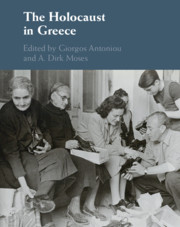Book contents
III - The Question of Property
Published online by Cambridge University Press: 26 October 2018
Summary
- Type
- Chapter
- Information
- The Holocaust in Greece , pp. 181 - 252Publisher: Cambridge University PressPrint publication year: 2018
- 1
- Cited by



